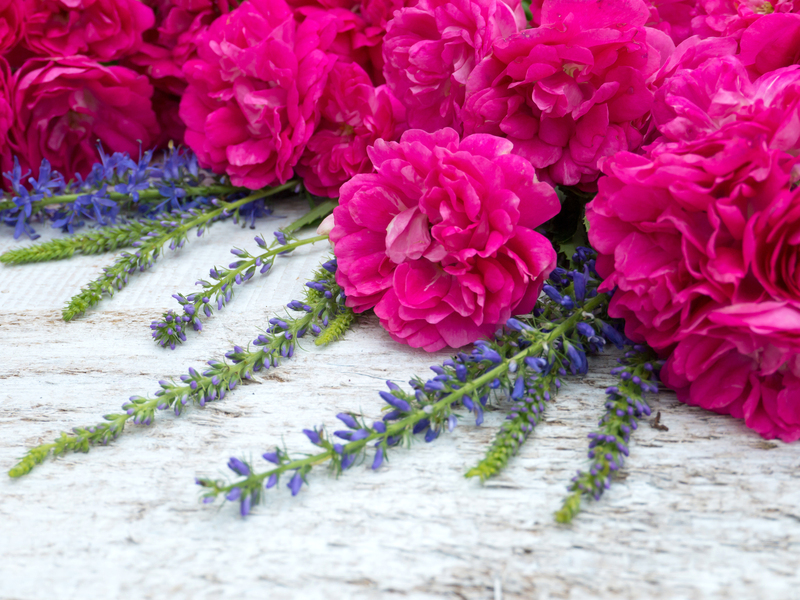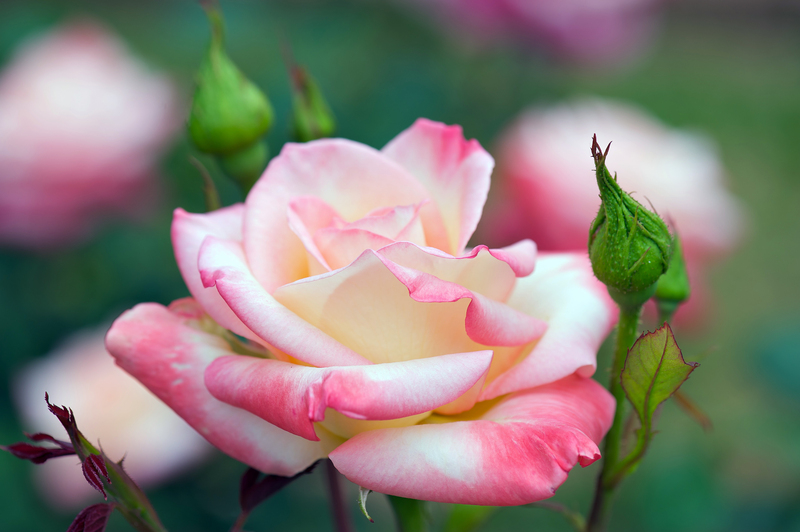Gardening Tips for Harmonizing with Your Dog
Posted on 11/09/2025
Gardening Tips for Harmonizing with Your Dog
Gardening is a joyful and calming activity, but sharing your green haven with a playful canine companion can bring new challenges and joys. Whether you have a puppy discovering the wonders of leaves or an adult dog who loves to dig, creating a garden that accommodates both your love for plants and your dog's needs is entirely possible. In this comprehensive guide, we'll cover a wide range of gardening tips for harmonizing with your dog, ensuring your yard thrives while keeping your furry friend safe and happy.

Understanding the Needs of Dogs in the Garden
Before you plan your landscape, it's important to recognize why dogs behave the way they do in gardens. Dogs are naturally curious, and gardens are full of enticing scents, textures, and visual stimuli. They may dig, chew, run around, or even relieve themselves among your prized plants. Recognizing your dog's individual habits is the first step to designing a dog-friendly garden that both you and your pet will cherish.
- Breed Traits: Some breeds, like terriers, have a stronger instinct to dig. Others, like retrievers and herding breeds, may be more likely to run paths around your garden.
- Size and Energy: Large, energetic dogs will need more space, while smaller dogs may fit easily in tighter garden areas.
- Chewing Habits: Puppies and young dogs, in particular, chew a lot.
- Personal Preferences: Your dog may have favorite spots for napping or exploring.
Why Harmonizing Your Garden With Your Dog Is Important
A harmonious garden not only protects your plants from canine misadventures but also keeps your pet safe from potentially toxic plants, harmful mulches, or dangerous tools. By thoughtfully planning your space, you foster a peaceful coexistence between your gardening passion and your dog's playful nature.
Designing a Dog-Friendly Garden Layout
The layout of your garden greatly affects how easily you can harmonize your gardening and dog ownership. Here are steps to optimize your garden for both beauty and canine enjoyment:
1. Establish Clear Paths
- Create Durable Walkways: Dogs naturally travel the same routes, which can result in muddy trails and damaged lawns. Use materials such as flagstones, bricks, or pea gravel to form defined paths, inviting your pup to follow these areas instead of trampling delicate plants.
- Border the Beds: Plant low hedges or place decorative fencing around flower beds to gently discourage detours into your plantings.
2. Designate Dig Zones
If your dog loves to dig, don't fight it--channel it! Create a "dig box" or sandy area where digging is encouraged. Bury toys or treats there to reinforce the behavior. This can protect the rest of your garden from becoming an excavation site.
3. Provide Shaded Resting Spots
- Offer shade: Use umbrellas, pergolas, or plant fast-growing trees for cool lounging spots.
- Comfy surfaces: Place dog beds or soft mulch in these areas for extra comfort.
4. Access to Fresh Water
Dogs can get thirsty playing outside. Add a decorative bowl or a doggy water feature that's easy to clean and refill. Consider a dog-safe fountain for a touch of charm and constant hydration.
Choosing Dog-Safe Plants for Your Garden
Certain plants are toxic to dogs and must be avoided at all costs. Others may cause mild discomfort if ingested. To achieve true harmonious gardening with your dog, opt for sturdy, non-toxic varieties and keep genuinely dangerous plants out of paws' reach.
Plants to Avoid for Your Dog's Safety
- Azalea
- Daffodil (bulbs in particular)
- Tulips (bulbs)
- Sago palm
- Lilies
- Foxglove
- Oleander
Reference the ASPCA's toxic plant list for a comprehensive guide before making plant purchases.
Dog-Friendly and Hardy Plants
- Sunflowers: Tall, non-toxic, and cheerful.
- Roses: While the thorns deter trampling, the flowers are safe for dogs.
- Snapdragons: Lovely and non-toxic.
- Marigolds: Mostly safe and also naturally deter some pests.
- Basil, rosemary, and thyme: Tough herbs that can handle a little roughhousing.
- Creeping thyme or Irish moss: Great for dog paths, able to tolerate some paw traffic.
If your dog likes to graze, consider planting a little "doggy meadow" with safe, edible grasses such as wheatgrass or barley grass.
Protecting Your Garden From Dog Damage
Mulches
Mulch helps soil retain moisture and reduces weeds, but not all mulches are created equal when you have pets around. Cocoa shell mulch is toxic--avoid it completely. Instead, opt for shredded bark, pine straw, or pebble mulches.
- Pine Bark Mulch: Attractive and safe for most gardens.
- Cedar Mulch: Naturally deters fleas but may not suit all plant types.
- Rubber Mulch: Durable but only for dogs who don't tend to chew.
Fencing and Barriers
- Decorative Fencing: Short pickets or metal mesh can keep paws off delicate flowers without obstructing your view.
- Living Barriers: Densely planted shrubs, lavender, or rosemary can dissuade exploration into off-limits areas.
- Raised Beds: Elevated planters are more difficult for dogs to jump into or dig through.
Repellents and Deterrents
Consider natural deterrents such as sprinkling citrus peels or using commercial, dog-safe repellents to mark off specific areas. Always avoid anything with harmful chemicals or scents irritating to your dog's sensitive nose.
Training Your Dog for Garden Harmony
Perhaps the most sustainable way to harmonize your dog with your garden is through positive, reward-based training. This not only protects your garden, but also strengthens your bond.
Set Clear Boundaries
- Use visual cues: Mark borders with stones or garden edging.
- Leash walks: At first, supervise your dog outside and gently redirect from off-limits areas.
- Reward good behavior: Treats and praise for staying on paths or using dig zones will help reinforce the right habits.
Supervision and Consistency
Never leave a new dog alone in the garden until you're confident of their limits. Consistent responses--redirecting, rewarding, or gently correcting--lead to long-lasting harmony between your garden and your canine companion.
Dealing With Dog Waste in the Garden
Dog waste can harm delicate plants and even transfer harmful pathogens to your soil. Respond thoughtfully:
- Designate a potty area: Train your dog to use a mulched corner or a gravel section.
- Regular cleanup: Remove waste daily to prevent hard-to-remove stains and keep the area hygienic.
- Compost caution: Never use pet waste in the compost destined for edible gardens.
Top Tip:
Train your dog to use a specific spot, and reward them heavily for compliance. This concentrates wear-and-tear and makes cleaning far easier.
Smart Irrigation and Watering Advice
Sprinklers and hoses can attract or frighten dogs, while pooled water in containers can pose a drowning risk. Here's how to irrigate wisely with dogs in mind:
- Subsurface drip systems: Hidden tubing stands up to paws and teeth, and keeps your garden evenly watered.
- Self-watering pots: These discourage playful splashing and are less likely to become mosquito breeding grounds.
- Secure water features: If you want a pond or fountain, ensure it's shallow or gated to protect your dog.
Encouraging Canine Enrichment in the Garden
The happiest dogs are the ones with plenty of stimulation. The best gardening tips for harmonizing with your dog involve making your garden a source of enrichment:
- Install agility features: Low jumps, tunnels, or stepping stones provide fun for active dogs.
- Sniffing corners: Plant strong-smelling herbs like mint, basil, or sage for olfactory fun.
- Visual stimulation: Bird baths, butterfly-friendly flowers, and moving sculptures enthrall dogs who like to observe.
- Shaded lookout platforms: Give your dog a vantage point or a soft spot by a window to survey their domain.
Seasonal Considerations for Dogs and Gardens
Every season brings unique challenges. Keep these dog and garden harmony tips in mind:
- Spring: Secure new seedlings with covers; watch for fertilizers and chemical applications that may be harmful to dogs.
- Summer: Provide constant freshwater and shade. Avoid walking or playing on hot surfaces, which can scorch sensitive paws.
- Autumn: Rake leaves promptly, as moldy organic matter may upset your dog's stomach.
- Winter: De-ice paths with pet-safe products--avoid salt-based melts as these can irritate paws and be toxic if licked.
Common Dog-Gardener Questions (FAQs)
What should I do if my dog eats a plant?
If you suspect your dog has eaten a toxic plant, call your veterinarian or the Animal Poison Control Center immediately. Knowing which plants are in your garden will help your vet respond quickly.
How can I stop my dog from digging?
Redirect digging to an approved area. You can also block off beds with mesh and increase your dog's exercise and stimulation to reduce digging caused by boredom.
Can I compost pet waste?
Only compost pet waste in a separate, specialized system--not with food garden compost. Dog waste can harbor bacteria and parasites dangerous to humans.

Conclusion: Enjoying a Harmonious Garden With Your Dog
With thoughtful planning and a bit of creativity, harmonizing your gardening with your dog leads to a safer, more functional, and ultimately more enjoyable garden for both of you. Embrace training, choose resilient plants, establish clear paths and boundaries, and always prioritize your dog's safety. An enriching, beautiful, and harmonious garden can be yours--one that both you and your loyal companion will cherish season after season.
Additional Resources for Dog-Friendly Gardening
- ASPCA List of Toxic and Non-Toxic Plants
- Gardener's Supply: Creating a Dog-Friendly Garden
- Humane Society: Pet Safe Yard and Garden Tips
Happy gardening! With these tips for harmonizing your gardening and your dog, you can cultivate a green oasis where both plants and paws thrive together.
Latest Posts
The First Steps to Rejuvenating a Neglected Yard
Making Your Garden a Kid's Wonderworld
Gardening Tips for Harmonizing with Your Dog
Weatherproofing Your Garden from Severe Damage
Transforming Our Planet: Gardening's Impact on Climate Change

